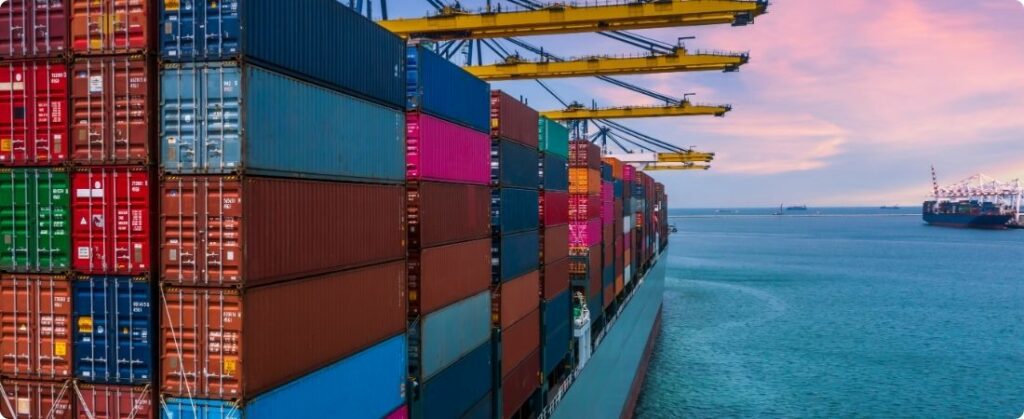
Recently, the international logistics sector has witnessed a significant increase in sea freight costs. Our after-sales assistants from the Soft Oils unit, Joana Vitória and Eduarda Goulart, explain the causes and consequences of the General Rates Increase, the adjustment of sea freight rates.

O General Rates Increase, or GRI, refers to an adjustment made by shipping companies to their freight rates, generally characterized by a price increase that varies according to global market demand. Depending on market variations, multiple adjustments may occur in a single year, as observed in 2024, with increases recorded in the months of May and July.
Emily Alissa, commercial manager at Columbus Logística Internacional, reveals that most shipping companies plan to implement the GRI by the end of December, with expectations of improvements in allocation starting in September. However, there is no estimate for a reduction in prices in the short term. According to US regulations, shipping companies must announce changes one month in advance so that customers can organize themselves. The new prices may vary depending on the routes and companies involved.
Factors that influence changes in freight rates

Several factors drive these changes, including supply and demand dynamics, where demand for exports or imports exceeds available supply, as well as operating, labor and fuel costs. Geopolitical conflicts, which result in wars and economic sanctions, route changes and increased freight rates, as well as peak season — a period of high demand directly linked to holidays such as Christmas and Chinese New Year — also influence the market, along with periods of high demand related to commodity harvests.
According to Allog Group, during peak season, vessel occupancy may exceed 120%. This drastic increase is usually predictable and, if well anticipated, can avoid significant setbacks and extra expenses. During these periods, it is essential that importers and exporters develop robust planning and anticipate their transportation needs to avoid cargo being left on the ground. The lack of available space on ships or aircraft can force companies to wait for a new shipping opportunity, complicating the receipt of goods. In addition, high occupancy during peak season often causes overbooking and shortages of containers, contributing to port congestion and, consequently, changes in sea freight rates.
Impact on logistics agents’ operations
An analysis of the impact of rising sea freight prices on logistics agents’ operations reveals that these changes affect all stages of the process, from booking to completion of the logistics operation. As costs escalate, it becomes imperative for companies to adjust their budgets and pricing to accommodate the increases. Additionally, renegotiating rates with customers, resulting from changes in freight prices, is essential. These practices not only avoid financial compromises in operations, but are also crucial to maintaining stable business relationships. Such circumstances often require reassessing and possibly redefining logistics routes in order to identify more economical and efficient alternatives.
To understand the most recent increase in freight rates, it is necessary to consider factors such as the conflict in the Red Sea, which continues to impact prices and transit times of cargo. Additional information can be found in our article “The impact of the Red Sea crisis on international logistics”.

Additionally, the shortage of containers has been exacerbated by the rise in the dollar, which encourages exports more than imports, preventing containers from returning to their countries of origin. Such increases have impacted maritime routes in the Americas and the Pacific, directly affecting the viability of operations in terms of time and cost. For routes in Latin America, the solution has been to divert via Chile, neutralizing the increase in freight. Exporters from countries such as Bolivia and Paraguay opt for road routes to Chilean ports, a more economical and faster option.
In maritime transport, changes can be sudden and require constant attention to new global developments. The conflict-affected Black Sea region is experiencing delays in the transit of cargo through the Suez Canal to the Middle East, China and India.
Impact of the increase in freight prices
The constant increase in freight prices affects everyone in foreign trade, from exporters to importers and logistics agents. Freight costs, being a critical component in product pricing, can determine the viability of an operation. Thus, the increase in sea freight represents a challenge that demands adaptation and strategic planning on the part of all agents involved. Despite the short-term uncertainties, it is essential that companies and logistics agents continue to invest in solutions to increase the efficiency of operations. In the long term, the market is expected to stabilize, although the volatility of sea freight rates remains a notable characteristic of the sector.
By Joana Vitória and Eduarda Goulart | After-sales assistants at the Soft Oils unit
Review by Vanessa Ferreira










